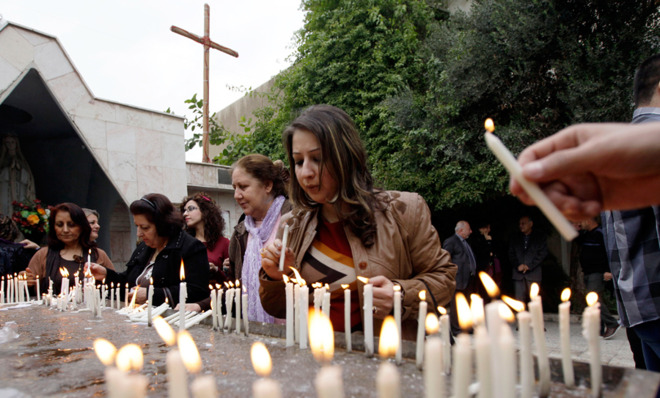Blame Obama and U.S. evangelicals for the persecution of Iraqi Christians
There's plenty of blame to go around


A free daily email with the biggest news stories of the day – and the best features from TheWeek.com
You are now subscribed
Your newsletter sign-up was successful
"Convert to Islam, leave, or die."
This is the ultimatum, given by Islamic extremists in Iraq, that has forced thousands of Christians to flee the communities they've inhabited for almost 2,000 years. In the wake of this crisis, some conservative evangelicals here in the United States have been unsurprisingly quick to point the finger at the Obama administration for its lack of urgency:
- Tony Perkins of Family Research Council commented, "I'm not sure what's more shocking: the atrocities of ISIS or the silence of the Obama administration."
- Todd Starnes, Fox News radio host and career bomb-thrower, said via Twitter: "Obama: The fate of Iraq hangs in the balance — so we're just gonna sit this one out."
- David French at The Christian Post blamed the president for the chaos in Iraq, adding that when it comes to Obama's foreign policy, "We'd laugh if lives weren't at stake."
Now look: The Obama administration's pullout from Iraq has doubtlessly contributed to this crisis. But these evangelical pundits fail to recognize that Christians in Iraq have faced extreme persecution since well before Obama took office. And though admitting it may taste bitter, evangelicals themselves must share the blame for the persecution of their brothers and sisters.
The Week
Escape your echo chamber. Get the facts behind the news, plus analysis from multiple perspectives.

Sign up for The Week's Free Newsletters
From our morning news briefing to a weekly Good News Newsletter, get the best of The Week delivered directly to your inbox.
From our morning news briefing to a weekly Good News Newsletter, get the best of The Week delivered directly to your inbox.
In a 60 Minutes interview filmed in late 2007 — more than a year before Obama moved into the White House — the Rev. Canon Andrew White, known as the Vicar of Baghdad, said the situation for Christians in Iraq was "clearly worse" than under Saddam Hussein.
"There's no comparison between Iraq now and then," White told correspondent Scott Pelley. "Things are the most difficult they have ever been for Christians. Probably ever in history. They've never known it like now."
Such persecution was made possible by a bipartisan American faction that supported the invasion of Iraq — an invasion that created a violent void in which sectarian violence raged. And let's not forget that this coalition included the strong, vocal, and public support of influential evangelicals — claiming to speak on behalf of the "Prince of Peace" no less.
Evangelical best-selling author Henry Blackaby argued at the time that "those who oppose the war to liberate Iraq need to read God's Word." He added, "There is no question that the current war to liberate Iraq is a 'just' war — according to biblical standards." He said those who opposed President Bush could bring God's judgment.
A free daily email with the biggest news stories of the day – and the best features from TheWeek.com
The late evangelical paragon Chuck Colson also argued in support of a preemptive strike in Iraq in a December 2002 Christianity Today op-ed, saying, "Sometimes going to war is the charitable thing to do."
An open letter organized by religious right leaders Richard Land, Bill Bright, Carl Herbster, Chuck Colson, and D. James Kennedy stated, "We believe that [George W. Bush's] policies concerning the ongoing international terrorist campaign against America are both right and just. Specifically, we believe that your stated policies concerning Saddam Hussein and his headlong pursuit and development of biochemical and nuclear weapons of mass destruction are prudent and fall well within the time-honored criteria of just war theory."
The Southern Baptist Convention, America's largest protestant denomination, even passed a 2003 resolution supporting the war in Iraq. The organization's actions, along with the support of other evangelicals, helped validate the Bush administration's invasion of Iraq and opened the door to our current reality.
The Palestinian poet Mourid Barghouti once wrote, "If you want to dispossess a people, the simplest way to do it is to tell their story and to start with 'secondly.'" In her Tedx talk, "The Danger of a Single Story," Chimamanda Ngozi Adichie riffed on this idea: "Start with the arrows of the Native Americans and not with the arrival of the British and you have an entirely different story. Start with the anger of African-Americans and not the lunch counter sit-ins or the whip of the plantation owner, and you have an entirely different story."
If you start with "secondly" — the rise of ISIS and the Obama administration's mishandling of the war — you'll tell one particular kind of story. But if you start with the Bush administration's misguided invasion of Iraq and the support given to it by American evangelicals, the narrative shifts.
The bipartisan coalition that supported the invasion of Iraq opened the door to Christian persecution in Iraq. Of course they didn't intend for this to happen — it was an unintended consequence. But that's hardly exonerating.
The Bush administration's subsequent policy of occupation, which resulted from a failure to heed Colin Powell's advice — "if you break it, you own it" — incubated this persecution. And now, the Obama administration's disastrous handling of the war has exacerbated the crisis.
But all of these actions — yes, all of them — have transformed Iraq into an incubator for anti-Christian Islamic extremism. Many American evangelical leaders — even those who now want to shift all blame to their political opponent — supported the invasion and occupation of Iraq, actions that contributed to the mass persecution of our brothers and sisters. And these leaders should be pleading for forgiveness, not pointing fingers.
Jonathan Merritt is author of the book Learning to Speak God from Scratch: Why Sacred Words are Vanishing — and How We Can Revive Them and a contributing writer for The Atlantic.
-
 Health insurance: Premiums soar as ACA subsidies end
Health insurance: Premiums soar as ACA subsidies endFeature 1.4 million people have dropped coverage
-
 Anthropic: AI triggers the ‘SaaSpocalypse’
Anthropic: AI triggers the ‘SaaSpocalypse’Feature A grim reaper for software services?
-
 NIH director Bhattacharya tapped as acting CDC head
NIH director Bhattacharya tapped as acting CDC headSpeed Read Jay Bhattacharya, a critic of the CDC’s Covid-19 response, will now lead the Centers for Disease Control and Prevention
